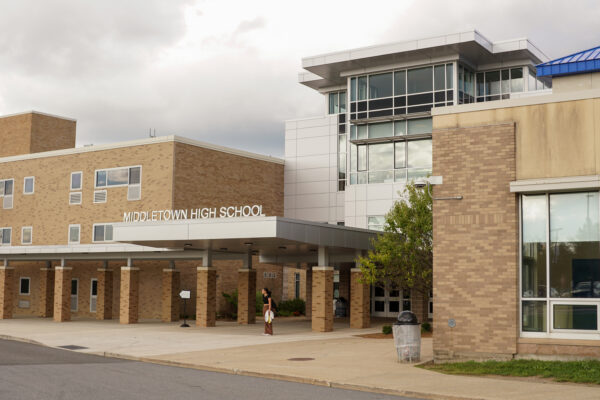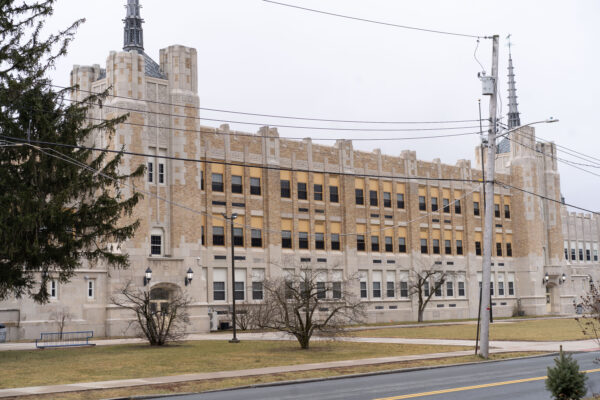Anthony Williams, a public school educator and a father of three, told The Epoch Times that he is running for Middletown District school board to change it for the better.
Born and raised in Brooklyn, Williams grew up in a single-family household and lost his mother when he was in middle school—an experience that built his resiliency and made it easier for him to connect with disadvantaged children later in his career, he said.
He was good at sports, especially basketball, which landed him an athletic scholarship at the State University of New York at Plattsburgh, where he majored in history.
“I had an opportunity to pursue a career in sports but decided to get a master’s in counseling,” Williams said. “I came into this profession with a certain mindset, dedication, and passion.”
After finishing his master’s degree, he worked for a brief stint at his college before returning home to Brooklyn to give back to his community.
He worked as a counselor at his former high school and then at Pathways in Technology Early College High School, where he met his future wife, Yaayaa Whaley-Williams.
In 2014, the couple moved to the City of Middletown for its lower cost of living and diversity.
Williams got a job as a guidance counselor at the Middletown School District and later became the dean of student services at Middletown High School.
Middletown School District Years
There, he took on an initiative to cut dropouts at the district’s only high school, home to about 2,000 students, with the supermajority being Hispanic and African American.
According to William’s observation, students with a high dropout risk often lacked support at home—they might have recently moved to the country and lived with families they didn’t grow up with or moved up from New York City with parents commuting long hours for work.
He noted that some students faced economic pressure and had to quit school to work.
Williams conducted an “exit interview” with each student considering quitting and asked them how the school could improve.
“I would like to get feedback from not just the students but their parents. I wanted to know where we dropped the ball and what we could have done differently,” he said.
About half the students going through the interviews decided not to quit, he said.
Since most students dropped out during their first year in high school, Williams focused on the freshmen class and the summer school program.

He also noticed that many male students got into behavior problems, such as conflicts and fights, after they failed to get into sports teams.
“That was one of the things that were in common—they were not part of anything, and they didn’t have anything productive to do,” Williams said.
So he got a list of such students from coaches and invited them into his basketball team.
There was one condition, though, which was that participants must keep working on their academics at the same time.
“If you are struggling in this particular class and you want to be part of this program, you have to step your game up, and you have to do better,” Williams said.
He named his team “Against All Odds,” which had about 20 students in its weekly training session last spring and played against the Middletown Police Department.
During his years at the district, Williams also started a mentorship program called “My Brother’s Keeper” with former colleague Omar Perez.
He said the program was based on the guidelines of then-President Barack Obama’s nationwide initiative to prepare disadvantaged kids for future success.
“I was not only searching for mentors among teachers and administrators that were in the school, but I also wanted mentors in the community,” Williams said. “We want to use the entire community to foster a positive environment for our kids.”
As a result, Middletown police chief John Ewanciw, Orange County Trust Company Vice President of Commercial Lending Ed Estrada, Bishop James Rollins, and small-business owner and barber Freddie Williams were invited onto the program, he said.
Aside from mentorship, the program provided various activities, including community circles, cooking classes, black history sessions, basketball games, and current event-themed discussions.
Leaving the District
However, according to Williams, after working with the Middletown District for about five years, he was forced to resign from his administrative post in June 2022.
The episode became part of an ongoing federal lawsuit in which Williams and two other former colleagues (including his wife Whaley-Williams) alleged that the Middletown District administration engaged in racial discrimination and retaliation against protected speech.
He said that the district unfairly terminated him for his association with his wife, who had spoken out about alleged discrimination at board meetings.
Following his wife’s speech, Williams was reassigned to a position under his previous job as the high school dean of student support services, according to the complaint.
Later, he was given an unreasonable time frame to obtain an extra certification to stay in his job.
He left the district in July 2022 and got a job as director of guidance and data at the Newburgh School District.

Meanwhile, according to the lawsuit, Whaley-Williams lost her district-wide math coordinator position following her board meeting speech and was assigned a role limited to one elementary school.
In July 2022, the district denied her tenure and terminated her employment, according to the complaint.
Since leaving, Whaley-Williams has started a bookstore in downtown Middletown that hosts various community cultural and educational events.
She now works as a director of student equity at Monticello Central School District.
The district’s attorney, Howard Miller, said that the job reassignments or terminations of the three plaintiffs were based on legitimate, objective reasons—not driven by racial bias or retaliation against protected speech, according to legal filings.
All fact-findings regarding the lawsuit are due in early July, according to a court order.
School Board Run
Launching a school board run for the first time, Williams said his top goal is to help bring about a more inclusive and tolerant district environment.
“We are all flawed people, and we are going to disagree,” he said. “I like an environment where people can respectfully and professionally disagree to bring about growth and positive changes.
“I don’t care if you are a Democrat, Republican, or whatever, let’s do our best for our kids. … If we are doing what’s best for kids, we must teach them that we can disagree and still learn from each other and respect each other,” he said.
He added that his run wasn’t personal.
“Things happen for a reason, and I am happy where I am now,” he said. “I just want to be on the board to serve my community.”
As to district policies, Williams said he hoped to revisit the new cellphone rules.
This year, the district began a new policy restricting cellphone use during the school day.
High schoolers must put their phones in a sealed pouch before entering the school building and can’t access them until the end of the school day, except for emergency reasons.

District Superintendent Amy Creeden proposed the policy to the school board to minimize social media distractions and promote engaged learning and in-person communications on campus, according to previous interviews with The Epoch Times.
However, Williams said he had many questions about the effectiveness of the policy and the way it is implemented; he also wanted to involve more parents in reviewing the rules.
“Process is everything, and it should be inclusive,” he said.
He also hopes to revisit the hiring policies, such as one that makes it hard for teachers with “C” scores on their transcripts to get a district job regardless of their stories.
“If you had a difficult situation and you got a C, but later you preserved and improved, with that experience, you can relate to many of the students and the demographic we serve,” Williams said.
Regarding budgets, he said he hoped for less spending on capital projects, such as the $81 million renovation of the Twin Towers Middle School building approved by voters in 2021.
He suggests that more money should go into what he calls preventive programs, including summer school, after-school classes, and vocational training.








